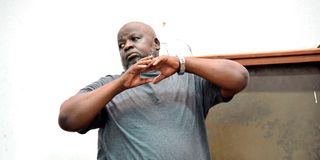
Swaleh Yusuf Ahmed (left) and his wife Asma Abdalla Mohamed in Shanzu Court on February 21, 2017.
| File | Nation Media GroupMombasa
Premium
Renting out your car? Find out its intended use
A criminal trial in a Mombasa Court has exposed why vehicle owners should find out what and where clients intend to do with leased vehicles or they may end up in legal proceedings with the state fighting for the property's forfeiture.
Musa Athman Kibirige found himself in a similar situation and lost his car to the state after the vehicle was found to have been used to transport narcotics.
When he rented out his vehicle, a Subaru Station Wagon KCH 429W, to Swaleh Yusuf Mohamed and his wife Asma Abdalla Mohamed in July 2017, he did not know it would end up being seized by the state.
The Mombasa couple is well-known for drug trafficking, as they have been charged in different courts for this offense.
They have been acquitted in some while others are still pending before different courts.
A few days after Kibirige rented out the vehicle to Swaleh, it was intercepted and narcotics were recovered.
On July 7, 2017, anti-narcotics police officers, following intelligence reports, trailed suspects who were in the vehicle in the Kikambala area of Kilifi County.
However, upon realizing they were being followed, some of the suspects managed to escape, leaving behind Swaleh and Asma.
The police recovered Sh503,400 and 201.1 grams of heroin from them. The vehicle was then towed to Bamburi police station.
The couple was subsequently charged with trafficking in narcotic drugs in the Shanzu court.
The next day, Kibirige was notified of the arrest and visited Bamburi police station to demand the release of his vehicle.

Swaleh Yusuf Ahmed in Mombasa Magistrate's Court on January 24, 2019.
However, he was advised to wait for the outcome of the criminal case against the couple.
While the criminal case was ongoing, the Director of Public Prosecutions (DPP) went to the High Court in Mombasa to request preservation orders to prevent the release or sale of the vehicle.
These orders were granted.
The criminal case against the couple concluded in 2020 with their acquittal as the court found no evidence against them.
Subsequently, the Assets and Recovery Agency (ARA) moved to the High Court and requested orders declaring the vehicle and the Sh503,400 proceeds of crime liable for forfeiture to the state.
The agency also asked the court to issue forfeiture orders, transferring the vehicle and funds to the government and ARA.
The agency argued that the vehicle was used as an instrument in the commission of an offense and is therefore subject to forfeiture.
Kibirige opposed this application and explained that the vehicle is his only source of income and that he had rented it out to the couple for monetary gain.
"When I went to Bamburi police station to ask for the release of my car after the couple was acquitted, I was served with a copy of an order prohibiting the release of the motor vehicle," he said.
He explained to Mombasa Presiding Judge Olga Sewe that he bought the vehicle from the proceeds of his small business as a broker and commission agent, not as a result of a crime.
"My small business has no clear records, and therefore, I cannot provide any supporting documents," he said.
Court records also indicate that Kibirige did not provide any documents or evidence to support his assertion that the couple had rented his vehicle.
Justice Sewe, however, ruled that the fact that three occupants of the vehicle ran away and escaped, and the recovery of the items by the police, all indicate that the vehicle was being used as an instrument for crime.
The judge also noted that the court was not informed about the owner of the Sh503,400 or how it was acquired.
“The cornerstone for forfeiture proceedings of unexplained assets is having assets disproportionate to known legitimate sources of income. Tied to this is the inability of an individual to satisfactorily explain the disproportionate assets,” said the judge.
Justice Sewe further ruled that the validity of an order for forfeiture is not dependent on the outcome of criminal proceedings, therefore, the acquittal of the couple was irrelevant to the forfeiture proceedings.
“The requirement to explain assets is not a requirement for one to explain his innocence. The presumption of innocence is a fundamental right that cannot be displaced through a notice to explain how assets have been acquired,” said the judge.
Justice Sewe concluded that, on a balance of probabilities, ARA proved that the vehicle was being used for the commission of a crime, and the Sh503,400 recovered by the police is proceeds of crime, therefore, they are liable to be forfeited to the state.
The court declared the vehicle and money to be instruments and proceeds of crime and ordered them to be transferred in the name of ARA, with the money being deposited on behalf of the state.





